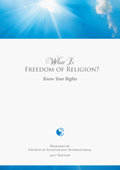Religious discrimination is prohibited under international human rights law. No individual or group may be subject to discrimination by any State, institution, group of persons, or person on grounds of religion or other beliefs. This includes any tendency to discriminate against any religion or belief for any reason, including the fact that they are newly established, non-theistic, non-traditional or represent religious minorities. [23] Discrimination between human beings on grounds of religion or belief constitutes an affront to human dignity and a disavowal of the human rights and fundamental freedoms proclaimed in the UN Bill of Rights. It also constitutes an obstacle to friendly and peaceful relations between nations. [24] States have a duty to take effective measures to protect all persons within their jurisdiction from discrimination on grounds of religion or belief, whatever the reasons advanced for such discrimination. This includes the duty to rescind discriminatory legislation and implement legislation that protects freedom of religion or belief in all fields of civil, economic, political, social and cultural life. States should also eliminate official policies and practices that facilitate such discrimination. [25]
The European Court of Human Rights has determined that the right to religious freedom mandates a strict duty of neutrality on the part of the State. This duty requires that the State refrain from taking part in religious disputes or favoring certain religious or secular groups over others.
The Human Rights Court also prohibits the State from reinterpreting, misinterpreting, analyzing, assessing or examining religious beliefs or the expression of these beliefs. For example, in Metropolitan Church of Bessarabia and Others v. Moldova, (13 December 2001), the Human Rights Court found as follows:
In exercising its regulatory power in this sphere and in its relations with the various religions, denominations and beliefs, the State has a duty to remain neutral and impartial. What is at stake here is the preservation of pluralism and the proper functioning of democracy. See Hasan and Chaush v. Bulgaria, App. No. 30985/96 (26 October 2000 § 78).
The Court further observes that in principle the right to freedom of religion for the purposes of the Convention excludes assessment by the State of the legitimacy of religious beliefs or the ways in which those beliefs are expressed.
[23] 1981 UN Declaration on the Elimination of All Forms of Intolerance and of Discrimination Based on Religion or Belief, Article 2; United Nations Human Rights Committee General Comment 22, ¶ 2.
[24] 1981 UN Declaration on the Elimination of All Forms of Intolerance and of Discrimination Based on Religion or Belief, Article 3.
[25] Ibid., Article 4; United Nations Human Rights Committee General Comment 22, ¶ 2.




























